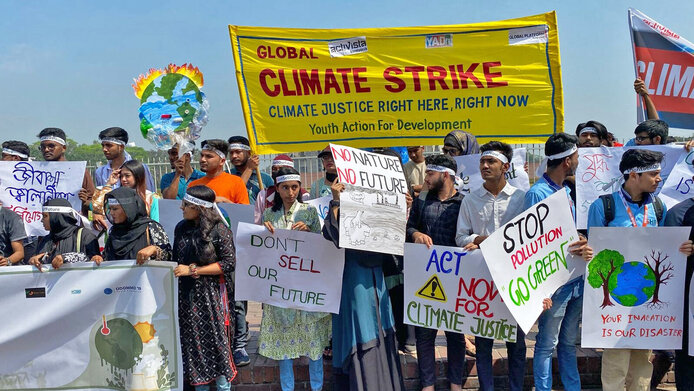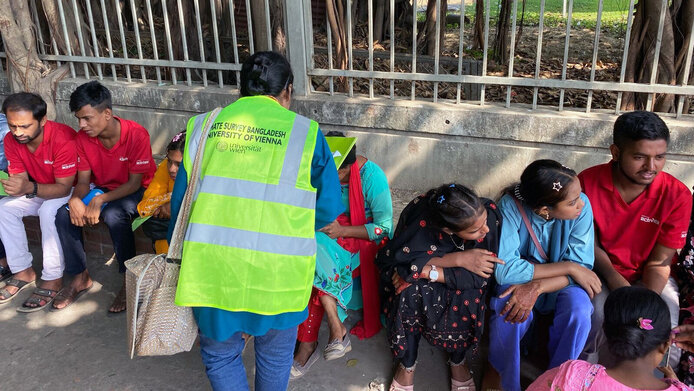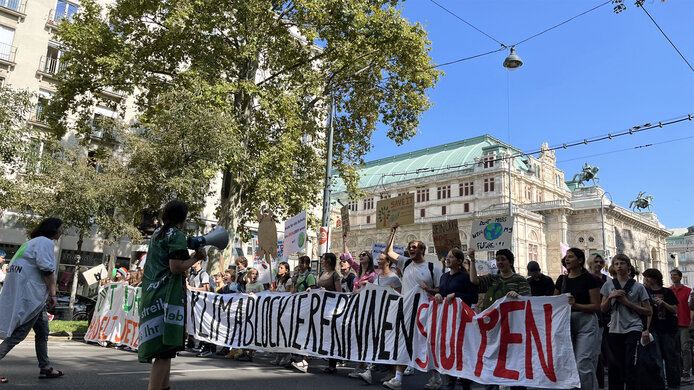Climate protests: international, angry, resolute

The story is well known: on a Friday, a lone schoolgirl standing in front of the Swedish parliament holding up a placard kicks off a big movement. In September 2019, millions of people in 150 countries took to the streets for Fridays for Future. The strikes have now dwindled, and today, the media declare the Fridays movement to be insignificant.
“There's a lot to be said against that,” says Antje Daniel, who has been conducting research on the Austrian Fridays branch since 2019. “Fridays for Future is the largest global movement since Occupy in 2011.” Since October 2023, Daniel has been the principal investigator of a research project funded by the Austrian Science Fund (FWF) that compares environmental youth activism in Austria, Bangladesh, and Uganda. She wants to better understand the movements and their impact, as they are an important civil society accompaniment to climate policy. In Uganda and Bangladesh they are even the most central climate policy activities.
Research requires working together
“In all three countries, the different groups of players have changed the public discourse on climate issues,” notes Daniel, whose research focuses on Europe and Africa. Co-leader Petra Dannecker is working on Southeast Asia. Doctoral students Fahima Al Farabi, Nancy Otyang, and Michaela Hochmuth support data collection in their respective countries. In addition, the close cooperation with researchers at the University of Dhaka and Makerere University in Kampala helps the team to adapt the research to local conditions and establish contacts.
“We want to explore differences and similarities between countries and also learn the impact of the local context on activism,” Antje Daniel explains. The researchers are interested in motivation, organization, strategies, and goals. For this purpose, they have asked a total of 577 activists to complete a survey, interviewed 169 activists and experts from civil society, academia, and political institutions, and attended protests, plenary meetings, and tree-planting campaigns in local communities.
The project
Since 2019, Fridays for Future has inspired a new global form of youth activism that has mobilized millions for climate justice. The movement is shaping politics and society worldwide, but has yet to be thoroughly researched scientifically. A research project with case studies on Austria, Bangladesh, and Uganda is investigating this global dimension.
On demonstrations, data, and chapati
The team is collecting data on who is campaigning for climate justice in different countries, how they are doing so, and what motivates them. They also take to the streets themselves for their research. Antje Daniel, for example, always attends the global climate protests in Vienna accompanied by students. There, they identify people they ask to fill out an online survey which includes questions about sociodemographic data, emotions, goals, political attitudes, and expectations of the protest. In Dhaka, during the protests in 2024 and 2025, students from Dhaka University helped conduct the surveys during the last climate strike.
Questions were also adapted to local contexts. In Uganda, for instance, questions about trust in political institutions were amended to include options for religious or local authorities. Formally speaking, there is freedom of assembly and expression in this African country. “But such activities are not possible there due to the authoritarian nature of the regime,” Antje Daniel explains. Protests take place less on the streets and more in other places, such as online.
The researchers therefore conducted the surveys in a different way. They organized activists' breakfasts at various locations, such as Mekarere University. Activists from Uganda's capital filled out the questionnaires while enjoying fruit, chapati, and soft drinks.
Who are the activists?
What are the differences between the movements? “In Austria, protests are increasingly becoming adapted to the average age of the population,” explains Antje Daniel, given that the share of protesters under 20 is declining and that of people over 65 is rising. In Uganda and Bangladesh, the movements are mainly made up of young academics between 20 and 35.
While Austria and Bangladesh have no (female) figureheads for the movement, Uganda has two: Vanessa Nakate and Hilda Nakabuye. “In Bangladesh, gender roles and gender inequality are rooted in religion and deeply entrenched,” says Antje Daniel. Only around 30 percent of the movement there is female, compared to around 60 percent in Austria.
Whereas all groups identify with the Fridays for Future label, the structures differ. In Uganda, for instance, there are many other organizations alongside FFF and the Rise Up Movement – with different focus areas from planting trees to tackling plastic pollution and other campaigns. Antje Daniel is amazed at the broad and intense activism that has developed there in an authoritarian system with limited leeway for action in the wake of Fridays for Future.
Childhood has an impact on the fight for the climate
The research team is also interested in what motivated people to become activists. “In some cases the motivation of activists in Bangladesh and Uganda is rooted in childhood experiences of floods, landslides, and forest fires. This is an important trigger for activism,” explains Daniel. Such experiences are reflected in people's emotions. Many activists in Uganda are concerned, frustrated, and angry, but less than half of those surveyed feel hopeless or powerless.
In Bangladesh, people are not only worried, but many of them also feel frustration. The delta state has long been suffering from climate impacts such as flooding, which displace people and result in fields becoming salinated. For just as long, there has been activism by youth networks and NGOs. Since 2019 they have been at work under the Fridays for Future banner.
While the movements in Uganda and Bangladesh raise awareness of climate issues among the local population – for example, through tree-planting campaigns in communities – the Austrian Fridays want to bring about change by exerting pressure on policy-makers.
Feelings of guilt and solidarity
In 2019, Austrian activists linked the climate crisis to fears about the future, such as shrinking standards of living and opportunities for action. Today, the majority feel anxious and angry.
In Uganda and Bangladesh, consequences of climate change such as health problems and food shortages have long been acute. “There, the climate crisis is interwoven with these aspects, which reinforce the experience of inequality,” explains Antje Daniel.
“In both countries, it's about climate colonialism – that is to say, inequality in the context of the climate crisis and global climate policy.” The Global North has contributed and continues to contribute more to the climate crisis, while the Global South suffers from its consequences and its demands are still not being heard enough at UN climate conferences.
But these international conferences are still important. Activists from Uganda and Bangladesh want to use the international stage to put pressure on local politicians. “It's about clarifying the question of who is to blame. In Bangladesh and Uganda, international climate policy decisions should be seen as having an impact at the national level,” says Antje Daniel. “Like a boomerang.”
United in pipeline protest
According to Daniel, the Austrian movement has spent the last three years reflecting on itself. Now it wants to use its privileges to support the Global South.
That is exactly what happened on June 2, 2023. Armed with signs and banners, local activists stood in front of the factory gates of the district heating technology company isoplus in Hohenberg, Lower Austria. The company wanted to enter into a joint venture to supply the alloy for the East African Crude Oil Pipeline (EACOP), which is designed to transport oil from Lake Albert in Uganda through Tanzania to the Indian Ocean. The Fridays also protested in Italy, Uganda, and Germany. In January 2024, isoplus withdrew from the contract. According to Antje Daniel, this campaign was a sign “that there is international solidarity and sharing in activism.”
How the Fridays are changing
Even beyond 2019, FFF still remains important, notes Daniels, because “at some point, mobilization does decline. Change takes place during this downward trend.” This can give rise to new things: new forms of protest, for example, or alliances with trade unions, the Last Generation, regional groups, and psychologists, grandparents, and workers who form For Future subgroups.
“Many of the early climate activists are now working in NGOs, politics, schools, or universities,” says Daniel. That's because activism shapes the individual. “Particularly those people who are active consistently over a long period of time describe it as a formative life experience that can also change political decisions in the long term.” Even beyond the protest activities and strikes, activism has a long-lasting impact on people’s biographies – specifically on personal and political behavior.
The project “Youth activism of Fridays for Future” is set to run until September 2026. In November 2025, Daniel will travel to Kampala for further field research. Understanding the movements and their agents is important, Daniel emphasizes, because “Fridays for Future remains a key player in holding governments and the international community accountable on climate policy.”
About the researcher
Antje Daniel is a sociologist and postdoctoral researcher at the Department of Development Studies at the University of Vienna. Daniel, who specializes in development and protest research, received her doctorate from the International Graduate School of African Studies at the University of Bayreuth and her venia docendi from the Friedrich-Alexander University of Erlangen-Nuremberg (FAU). Antje Daniel held a professorship in development studies and a visiting professorship in disaster sociology at the Akkon University of Human Science in Berlin and was a visiting scholar at the Universities of Johannesburg and KwaZulu-Natal. The basic research project “Youth activism of Fridays for Future” (2023–2026) has been awarded EUR 525,000 in funding from the Austrian Science Fund (FWF).
Selected publications
An intersectional approach to climate activism – Fridays For Future in the pursuit of inclusivity, in: Österreichische Zeitschrift für Soziologie 2025
Is Fridays for Future a Phenomenon of the Global North? Youth Activism of Fridays for Future: An Intersectional and Global Perspective, in: Journal für Entwicklungspolitik 2024
5 Jahre Fridays For Future – Ergebnisse von 5 Jahren Protest Survey, 2024







